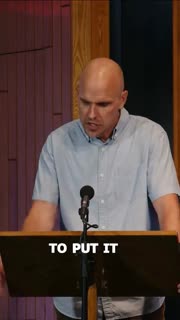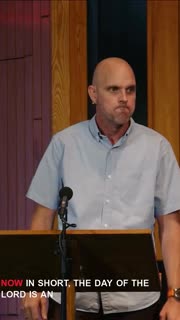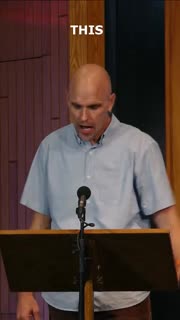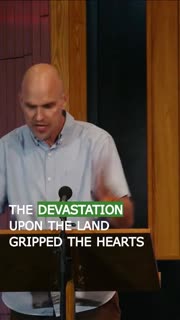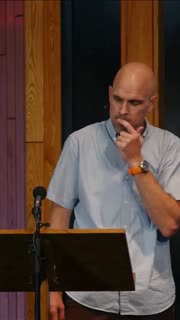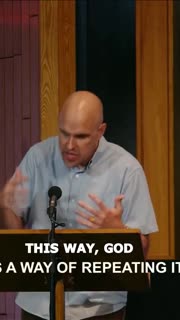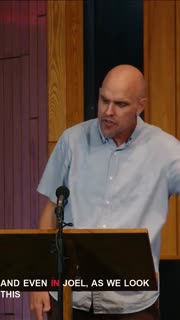Understanding God's Judgment: Hell, Wrath, and Redemption
Devotional
Sermon Summary
Bible Study Guide
Sermon Clips
### Quotes for Outreach
1. "To put it another way, we cannot understand God's love until we understand the reality of God's wrath. You see, God's wrath is a settled, controlled opposition against hatred of anything that is destroying what he loves. God's wrath flows from his love for creation. It flows from his justice. He's angry at greed and self-centeredness and justice and evil because they're destructive. God will not tolerate anything or anyone responsible for destroying the creation and the people that he loves." [11:34] (35 seconds)
2. "Now in short, the day of the Lord is an event of God's judgment against all evil, culminating in the deliverance and the redemption of all that belongs to him. This day is terrifying to the enemy of Christ. But it should be anticipated with great joy for the believer in Christ. Because on this day, friends, every wrong will be made right, the wicked will be vanquished, Christ will rule from his throne, and every hope and promise fulfilled." [30:36] (34 seconds)
3. "On this day, friends, on this day, the only thing that will matter is what you decide to do with Jesus Christ. He is the difference maker on the day of the Lord. The judgment we deserve or the promises we receive all run through Christ. Jesus is on his throne, and when he comes again, friends, it will not be as a humble servant. It will be as a conquering king. And so the time is now. Your day is now to receive what God has given to you in full." [58:34] (40 seconds)
4. "God wants us to rend our hearts and not our garments, which means he doesn't want us to keep performing religious things and doing good works. He wants us to repent. He wants us to tear our hearts in two with genuine sorrow over our sins. That's what it means to rend. It means to kind of tear into two pieces. And so when we rend our hearts, we are doing this because we have a genuine understanding of who we are in light of who he is." [59:15] (32 seconds)
### Quotes for Members
1. "The devastation upon the land gripped the hearts of the people to mourn over what was lost. And just for a visual reference real quick, we have to see for ourselves just how vast and overwhelming these locusts can be. I mean, this is just one small picture, a small pane that can't capture the totality of the sky, and the horizon, but you can appreciate just how numerous they are. These locusts swell up to such an extent and they swarm in such a way, you can find pictures of this, that you can understand why the biblical language of locusts even includes the idea of darkening the sky." [35:30] (39 seconds)
2. "So when we turn to Joel and we look at these first two chapters, the locust presents us with an image of what the day had looked like, while the second chapter will present us with an image of what the day could look like, this invading army. But both of these things are meant to do one thing and one thing only, which is to awaken the heart to repentance." [47:23] (23 seconds)
3. "So when we think of it in this way, God has already judged against us. It's the overflow of a rebellious heart. And this pattern goes all the way back to Eden when God judged Adam and Eve for their selfishness and their pride of wanting to be like God themselves. And he severed them from life by removing them from his presence. What has been will be again. But we also see in this pattern of history the gracious provision of God. What has been will be again." [54:34] (34 seconds)
4. "And even in Joel, as we look this morning, we see the promise of the Spirit of God being poured out upon those who put their faith and trust in Jesus. What is so beautiful about Joel 2, verse 28 is that it is a known promise fulfilled. Jesus Christ came. He died. He gave his life for our sin. And through his resurrection, we have the confidence of his divinity and his awesome power." [55:50] (25 seconds)
5. "So, friends, it's not only a confession that we offer up, acknowledging our weakness and our limitation, or maybe even our shame, but it's also a declaration of our faith. And it's a declaration of our faith that we are not alone. We are not alone. We are not alone. We are not alone. We are not alone. We are not alone. We are not alone. We are not alone. We are not alone. We are not alone. We are not alone. We are not alone. We are not alone. We are not alone. We are not alone. We are not alone. We are not alone. We are not alone. We are not alone. We are not alone. We are not alone. We are not alone. We are not alone. We are not alone. We are not alone. We are not alone. We are not alone. We are not alone. We are not alone. We are not alone. We are not alone. We are not alone. We are not alone. We are not alone. We are not alone. We are not alone. We are not alone. We are not alone. We are not alone. We are not alone. We are not alone. We are not alone. We are not alone. We are not alone. We are not alone. We are not alone. We are not alone. We are not alone. We are not alone. We are not alone. We are not alone. We are not alone. We are not alone. We are not alone. We are not alone. We are not alone. We are not alone. We are not alone. We are not alone. We are not alone. We are not alone. We are not alone. We are not alone. We are not alone. We are not alone. We are not alone. We are not alone. We are not alone. We are not alone. We are not alone. We are not alone. We are not alone. We are not alone. We are not alone. We are not alone. We are not alone. We are not alone. We are not alone. We are not alone. We are not alone. We are not alone. We are not alone. We are not alone. We are not alone. We are not alone. We are not alone. We are not alone. We are not alone. We are not alone. We are not alone. We are not alone. We are not alone. We are not alone. We are not alone. We are not alone. We are not alone. We are not alone. We are not alone. We are not alone. We are not alone. We are not alone. We are not alone. We are not alone. We are not alone. We are not alone. We are not alone. We are not alone. We are not alone. We are not alone. We are not alone. We are not alone. We are not alone. We are not alone. We are not alone. We are not alone. We are not alone. We are not alone. We are not alone. We are not alone. We are not alone. We are not alone. We are not alone. We are not alone. We are not alone. We are not alone. We are not alone. We are not alone. We are not alone. We are not alone. We are not alone. We are not alone. We are not alone. We are not alone. We are not alone. We are not alone. We are not alone. We are not alone. We are not alone. We are not alone. We are not alone. We are not alone. We are not alone. We are not alone. We are not alone. We are not alone. We are not alone. We are not alone. We are not alone. We are not alone. We are not alone. We are not alone. We are not alone. We are not alone. We are not alone. We are not alone. We are not alone. We are not alone. We are not alone. We are not alone. We are not alone. We are not alone. We are not alone. We are not alone. We are not alone. We are not alone. We are not alone. We are not alone. We are not alone. We are not alone. We are not alone. We are not alone. We are not alone. We are not alone. We are not alone. We are not alone. We are not alone. We are not alone. We are not alone. We are not alone. We are not alone. We are not alone. We are not alone. We are not alone. We are not alone. We are not alone. We are not alone. We are not alone. We are not alone. We are not alone. We are not alone. We are not alone. We are not alone. We are not alone. We are not alone. We are not alone. We are not alone. We are not alone. We are not alone. We are not alone. We are not alone. We are not alone. We are not alone. We are not alone. We are not alone. We are not alone. We are not alone. We are not alone. We are not alone. We are not alone. We are not alone. We are not alone. We are not alone. We are not alone. We are not alone. We are not alone. We are not alone. We are not alone. We are not alone. We are not alone. We are not alone. We are not alone. We are not alone. We are not alone. We are not alone. We are not alone. We are not alone. We are not alone. We are not alone. We are not alone. We are not alone. We are not alone. We are not alone. We are not alone. We are not alone. We are not alone. We are not alone. We are not alone. We are not alone. We are not alone. We are not alone. We are not alone. We are not alone. We are not alone. We are not alone. We are not alone. We are not alone. We are not alone. We are not alone. We are not alone. We are not alone. We are not alone. We are not alone. We are not alone. We are not alone. We are not alone. We are not alone. We are not alone. We are not alone. We are not alone. We are not alone. We are not alone. We are not alone. We are not alone. We are not alone. We are not alone. We are not alone. We are not alone. We are not alone. We are not alone. We are not alone. We are not alone. We are not alone. We are not alone. We are not alone. We are not alone. We are not alone. We are not alone. We are not alone. We are not alone. We are not alone. We are not alone. We are not alone. We are not alone. We are not alone. We are not alone. We are not alone. We are not alone. We are not alone. We are not alone. We are not alone. We are not alone. We are not alone. We are not alone. We are not alone. We are not alone. We are not alone. We are not alone. We are not alone. We are not alone. We are not alone. We are not alone. We are not alone. We are not alone. We are not alone. We are not alone. We are not alone. We are not alone. We are not alone. We are not alone. We are not alone. We are not alone. We are not alone. We are not alone. We are not alone. We are not alone. We are not alone. We are not alone. We are not alone. We are not alone. We are not alone. We are not alone. We are not alone. We are not alone. We are not alone. We are not alone. We are not alone. We are not alone. We are not alone. We are not alone. We are not alone. We are not alone. We are not alone. We are not alone. We are not alone. We are not alone. We are not alone. We are not alone. We are not alone. We are not alone. We are not alone. We are not alone. We are not alone. We are not alone. We are not alone. We are not alone. We are not alone. We are not alone. We are not alone. We are not alone. We are not alone. We are not alone. We are not alone. We are not alone. We are not alone. We are not alone. We are not alone. We are not alone. We are not alone. We are not alone. We are not alone. We are not alone. We are not alone. We are not alone. We are not alone. We are not alone. We are not alone. We are not alone. We are not alone. We are not alone. We are not alone. We are not alone. We are not alone. We are not alone. We are not alone. We are not alone. We are not alone. We are not alone. We are not alone. We are not alone. We are not alone. We are not alone. We are not alone. We are not alone. We are not alone. We are not alone. We are not alone. We are not alone. We are not alone. We are not alone. We are not alone. We are not alone. We are not alone. We are not alone. We are not alone. We are not alone. We are not alone. We are not alone. We are not alone. We are not alone. We are not alone. We are not alone. We are not alone. We are not alone. We are not alone. We are not alone. We are not alone. We are not alone. We are not alone. We are not alone. We are not alone. We are not alone. We are not alone. We are not alone. We are not alone. We are not alone. We are not alone. We are not alone. We are not alone. We are not alone. We are not alone. We are not alone. We are not alone. We are not alone. We are not alone. We are not alone. We are not alone. We are not alone. We are not alone. We are not alone. We are not alone. We are not alone. We are not alone. We are not alone. We are not alone. We are not alone. We are not alone. We are not alone. We are not alone. We are not alone. We are not alone. We are not alone. We are not alone. We are not alone. We are not alone. We are not alone. We are not alone. We are not alone. We are not alone. We are not alone. We are not alone. We are not alone. We are not alone. We are not alone. We are not alone. We are not alone. We are not alone. We are not alone. We are not alone. We are not alone. We are not alone. We are not alone. We are not alone. We are not alone. We are not alone. We are not alone. We are not alone. We are not alone. We are not alone. We are not alone. We are not alone. We are not alone. We are not alone. We are not alone. We are not alone. We are not alone. We are not alone. We are not alone. We are not alone. We are not alone. We are not alone. We are not alone. We are not alone. We are not alone. We are not alone. We are not alone. We are not alone. We are not alone. We are not alone. We are not alone. We are not alone. We are not alone. We are not alone. We are not alone. We are not alone. We are not alone. We are not alone. We are not alone. We are not alone. We are not alone. We are not alone. We are not alone. We are not alone. We are not alone. We are not alone. We are not alone. We are not alone. We are not alone. We are not alone. We are not alone. We are not alone. We are not alone. We are not alone. We are not alone. We are not alone. We are not alone. We are not alone. We are not alone. We are not alone. We are not alone. We are not alone. We are not alone. We are not alone. We are not alone. We are not alone. We are not alone. We are not alone. We are not alone. We are not alone. We are not alone. We are not alone. We are not alone. We are not alone. We are not alone. We are not alone. We are not alone. We are not alone. We are not alone. We are not alone. We are not alone. We are not alone. We are not alone. We are not alone. We are not alone. We are not alone. We are not alone. We are not alone. We are not alone. We are not alone. We are not alone. We are not alone. We are not alone. We are not alone. We are not alone. We are not alone. We are not alone. We are not alone. We are not alone. We are not alone. We are not alone. We are not alone. We are not alone. We are not alone. We are not alone. We are not alone. We are not alone. We are not alone. We are not alone. We are not alone. We are not alone. We are not alone. We are not alone. We are not alone. We are not alone. We are not alone. We are not alone. We are not alone. We are not alone. We are not alone. We are not alone. We are not alone. We are not alone. We are not alone. We are not alone. We are not alone. We are not alone. We are not alone. We are not alone. We are not alone. We are not alone. We are not alone. We are not alone. We are not alone. We are not alone. We are not alone. We are not alone. We are not alone. We are not alone. We are not alone. We are not alone. We are not alone. We are not alone. We are not alone. We are not alone. We are not alone. We are not alone. We are not alone. We are not alone. We are not alone. We are not alone. We are not alone. We are not alone. We are not alone. We are not alone. We are not alone. We are not alone. We are not alone. We are not alone. We are not alone. We are not alone. We are not alone. We are not alone. We are not alone. We are not alone. We are not alone. We are not alone. We are not alone. We are not alone. We are not alone. We are not alone. We are not alone. We are not alone. We are not alone. We are not alone. We are not alone. We are not alone. We
Ask a question about this sermon
1. "To put it another way, we cannot understand God's love until we understand the reality of God's wrath. You see, God's wrath is a settled, controlled opposition against hatred of anything that is destroying what he loves. God's wrath flows from his love for creation. It flows from his justice. He's angry at greed and self-centeredness and justice and evil because they're destructive. God will not tolerate anything or anyone responsible for destroying the creation and the people that he loves." [11:34] (35 seconds)
2. "Now in short, the day of the Lord is an event of God's judgment against all evil, culminating in the deliverance and the redemption of all that belongs to him. This day is terrifying to the enemy of Christ. But it should be anticipated with great joy for the believer in Christ. Because on this day, friends, every wrong will be made right, the wicked will be vanquished, Christ will rule from his throne, and every hope and promise fulfilled." [30:36] (34 seconds)
3. "On this day, friends, on this day, the only thing that will matter is what you decide to do with Jesus Christ. He is the difference maker on the day of the Lord. The judgment we deserve or the promises we receive all run through Christ. Jesus is on his throne, and when he comes again, friends, it will not be as a humble servant. It will be as a conquering king. And so the time is now. Your day is now to receive what God has given to you in full." [58:34] (40 seconds)
4. "God wants us to rend our hearts and not our garments, which means he doesn't want us to keep performing religious things and doing good works. He wants us to repent. He wants us to tear our hearts in two with genuine sorrow over our sins. That's what it means to rend. It means to kind of tear into two pieces. And so when we rend our hearts, we are doing this because we have a genuine understanding of who we are in light of who he is." [59:15] (32 seconds)
### Quotes for Members
1. "The devastation upon the land gripped the hearts of the people to mourn over what was lost. And just for a visual reference real quick, we have to see for ourselves just how vast and overwhelming these locusts can be. I mean, this is just one small picture, a small pane that can't capture the totality of the sky, and the horizon, but you can appreciate just how numerous they are. These locusts swell up to such an extent and they swarm in such a way, you can find pictures of this, that you can understand why the biblical language of locusts even includes the idea of darkening the sky." [35:30] (39 seconds)
2. "So when we turn to Joel and we look at these first two chapters, the locust presents us with an image of what the day had looked like, while the second chapter will present us with an image of what the day could look like, this invading army. But both of these things are meant to do one thing and one thing only, which is to awaken the heart to repentance." [47:23] (23 seconds)
3. "So when we think of it in this way, God has already judged against us. It's the overflow of a rebellious heart. And this pattern goes all the way back to Eden when God judged Adam and Eve for their selfishness and their pride of wanting to be like God themselves. And he severed them from life by removing them from his presence. What has been will be again. But we also see in this pattern of history the gracious provision of God. What has been will be again." [54:34] (34 seconds)
4. "And even in Joel, as we look this morning, we see the promise of the Spirit of God being poured out upon those who put their faith and trust in Jesus. What is so beautiful about Joel 2, verse 28 is that it is a known promise fulfilled. Jesus Christ came. He died. He gave his life for our sin. And through his resurrection, we have the confidence of his divinity and his awesome power." [55:50] (25 seconds)
5. "So, friends, it's not only a confession that we offer up, acknowledging our weakness and our limitation, or maybe even our shame, but it's also a declaration of our faith. And it's a declaration of our faith that we are not alone. We are not alone. We are not alone. We are not alone. We are not alone. We are not alone. We are not alone. We are not alone. We are not alone. We are not alone. We are not alone. We are not alone. We are not alone. We are not alone. We are not alone. We are not alone. We are not alone. We are not alone. We are not alone. We are not alone. We are not alone. We are not alone. We are not alone. We are not alone. We are not alone. We are not alone. We are not alone. We are not alone. We are not alone. We are not alone. We are not alone. We are not alone. We are not alone. We are not alone. We are not alone. We are not alone. We are not alone. We are not alone. We are not alone. We are not alone. We are not alone. We are not alone. We are not alone. We are not alone. We are not alone. We are not alone. We are not alone. We are not alone. We are not alone. We are not alone. We are not alone. We are not alone. We are not alone. We are not alone. We are not alone. We are not alone. We are not alone. We are not alone. We are not alone. We are not alone. We are not alone. We are not alone. We are not alone. We are not alone. We are not alone. We are not alone. We are not alone. We are not alone. We are not alone. We are not alone. We are not alone. We are not alone. We are not alone. We are not alone. We are not alone. We are not alone. We are not alone. We are not alone. We are not alone. We are not alone. We are not alone. We are not alone. We are not alone. We are not alone. We are not alone. We are not alone. We are not alone. We are not alone. We are not alone. We are not alone. We are not alone. We are not alone. We are not alone. We are not alone. We are not alone. We are not alone. We are not alone. We are not alone. We are not alone. We are not alone. We are not alone. We are not alone. We are not alone. We are not alone. We are not alone. We are not alone. We are not alone. We are not alone. We are not alone. We are not alone. We are not alone. We are not alone. We are not alone. We are not alone. We are not alone. We are not alone. We are not alone. We are not alone. We are not alone. We are not alone. We are not alone. We are not alone. We are not alone. We are not alone. We are not alone. We are not alone. We are not alone. We are not alone. We are not alone. We are not alone. We are not alone. We are not alone. We are not alone. We are not alone. We are not alone. We are not alone. We are not alone. We are not alone. We are not alone. We are not alone. We are not alone. We are not alone. We are not alone. We are not alone. We are not alone. We are not alone. We are not alone. We are not alone. We are not alone. We are not alone. We are not alone. We are not alone. We are not alone. We are not alone. We are not alone. We are not alone. We are not alone. We are not alone. We are not alone. We are not alone. We are not alone. We are not alone. We are not alone. We are not alone. We are not alone. We are not alone. We are not alone. We are not alone. We are not alone. We are not alone. We are not alone. We are not alone. We are not alone. We are not alone. We are not alone. We are not alone. We are not alone. We are not alone. We are not alone. We are not alone. We are not alone. We are not alone. We are not alone. We are not alone. We are not alone. We are not alone. We are not alone. We are not alone. We are not alone. We are not alone. We are not alone. We are not alone. We are not alone. We are not alone. We are not alone. We are not alone. We are not alone. We are not alone. We are not alone. We are not alone. We are not alone. We are not alone. We are not alone. We are not alone. We are not alone. We are not alone. We are not alone. We are not alone. We are not alone. We are not alone. We are not alone. We are not alone. We are not alone. We are not alone. We are not alone. We are not alone. We are not alone. We are not alone. We are not alone. We are not alone. We are not alone. We are not alone. We are not alone. We are not alone. We are not alone. We are not alone. We are not alone. We are not alone. We are not alone. We are not alone. We are not alone. We are not alone. We are not alone. We are not alone. We are not alone. We are not alone. We are not alone. We are not alone. We are not alone. We are not alone. We are not alone. We are not alone. We are not alone. We are not alone. We are not alone. We are not alone. We are not alone. We are not alone. We are not alone. We are not alone. We are not alone. We are not alone. We are not alone. We are not alone. We are not alone. We are not alone. We are not alone. We are not alone. We are not alone. We are not alone. We are not alone. We are not alone. We are not alone. We are not alone. We are not alone. We are not alone. We are not alone. We are not alone. We are not alone. We are not alone. We are not alone. We are not alone. We are not alone. We are not alone. We are not alone. We are not alone. We are not alone. We are not alone. We are not alone. We are not alone. We are not alone. We are not alone. We are not alone. We are not alone. We are not alone. We are not alone. We are not alone. We are not alone. We are not alone. We are not alone. We are not alone. We are not alone. We are not alone. We are not alone. We are not alone. We are not alone. We are not alone. We are not alone. We are not alone. We are not alone. We are not alone. We are not alone. We are not alone. We are not alone. We are not alone. We are not alone. We are not alone. We are not alone. We are not alone. We are not alone. We are not alone. We are not alone. We are not alone. We are not alone. We are not alone. We are not alone. We are not alone. We are not alone. We are not alone. We are not alone. We are not alone. We are not alone. We are not alone. We are not alone. We are not alone. We are not alone. We are not alone. We are not alone. We are not alone. We are not alone. We are not alone. We are not alone. We are not alone. We are not alone. We are not alone. We are not alone. We are not alone. We are not alone. We are not alone. We are not alone. We are not alone. We are not alone. We are not alone. We are not alone. We are not alone. We are not alone. We are not alone. We are not alone. We are not alone. We are not alone. We are not alone. We are not alone. We are not alone. We are not alone. We are not alone. We are not alone. We are not alone. We are not alone. We are not alone. We are not alone. We are not alone. We are not alone. We are not alone. We are not alone. We are not alone. We are not alone. We are not alone. We are not alone. We are not alone. We are not alone. We are not alone. We are not alone. We are not alone. We are not alone. We are not alone. We are not alone. We are not alone. We are not alone. We are not alone. We are not alone. We are not alone. We are not alone. We are not alone. We are not alone. We are not alone. We are not alone. We are not alone. We are not alone. We are not alone. We are not alone. We are not alone. We are not alone. We are not alone. We are not alone. We are not alone. We are not alone. We are not alone. We are not alone. We are not alone. We are not alone. We are not alone. We are not alone. We are not alone. We are not alone. We are not alone. We are not alone. We are not alone. We are not alone. We are not alone. We are not alone. We are not alone. We are not alone. We are not alone. We are not alone. We are not alone. We are not alone. We are not alone. We are not alone. We are not alone. We are not alone. We are not alone. We are not alone. We are not alone. We are not alone. We are not alone. We are not alone. We are not alone. We are not alone. We are not alone. We are not alone. We are not alone. We are not alone. We are not alone. We are not alone. We are not alone. We are not alone. We are not alone. We are not alone. We are not alone. We are not alone. We are not alone. We are not alone. We are not alone. We are not alone. We are not alone. We are not alone. We are not alone. We are not alone. We are not alone. We are not alone. We are not alone. We are not alone. We are not alone. We are not alone. We are not alone. We are not alone. We are not alone. We are not alone. We are not alone. We are not alone. We are not alone. We are not alone. We are not alone. We are not alone. We are not alone. We are not alone. We are not alone. We are not alone. We are not alone. We are not alone. We are not alone. We are not alone. We are not alone. We are not alone. We are not alone. We are not alone. We are not alone. We are not alone. We are not alone. We are not alone. We are not alone. We are not alone. We are not alone. We are not alone. We are not alone. We are not alone. We are not alone. We are not alone. We are not alone. We are not alone. We are not alone. We are not alone. We are not alone. We are not alone. We are not alone. We are not alone. We are not alone. We are not alone. We are not alone. We are not alone. We are not alone. We are not alone. We are not alone. We are not alone. We are not alone. We are not alone. We are not alone. We are not alone. We are not alone. We are not alone. We are not alone. We are not alone. We are not alone. We are not alone. We are not alone. We are not alone. We are not alone. We are not alone. We are not alone. We are not alone. We are not alone. We are not alone. We are not alone. We are not alone. We are not alone. We are not alone. We are not alone. We are not alone. We are not alone. We are not alone. We are not alone. We are not alone. We are not alone. We are not alone. We are not alone. We are not alone. We are not alone. We are not alone. We are not alone. We are not alone. We are not alone. We are not alone. We are not alone. We are not alone. We are not alone. We are not alone. We are not alone. We are not alone. We are not alone. We are not alone. We are not alone. We are not alone. We are not alone. We are not alone. We are not alone. We are not alone. We are not alone. We are not alone. We are not alone. We are not alone. We are not alone. We are not alone. We are not alone. We are not alone. We are not alone. We are not alone. We are not alone. We are not alone. We are not alone. We are not alone. We are not alone. We are not alone. We are not alone. We are not alone. We are not alone. We are not alone. We are not alone. We are not alone. We are not alone. We are not alone. We are not alone. We are not alone. We are not alone. We are not alone. We are not alone. We are not alone. We are not alone. We are not alone. We are not alone. We are not alone. We are not alone. We are not alone. We are not alone. We are not alone. We are not alone. We are not alone. We are not alone. We are not alone. We are not alone. We are not alone. We are not alone. We are not alone. We are not alone. We are not alone. We are not alone. We are not alone. We are not alone. We are not alone. We are not alone. We are not alone. We are not alone. We are not alone. We are not alone. We are not alone. We are not alone. We are not alone. We are not alone. We are not alone. We are not alone. We are not alone. We are not alone. We are not alone. We are not alone. We are not alone. We are not alone. We are not alone. We are not alone. We are not alone. We are not alone. We are not alone. We are not alone. We are not alone. We are not alone. We are not alone. We are not alone. We
